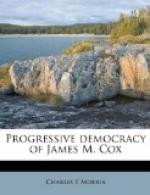But while Governor Cox’s intimates compare him often with Roosevelt, they prefer to liken him to Andrew Jackson. For Cox is the true Twentieth Century Jacksonian, they say. Like Andrew Jackson, Governor Cox can improvise the organization of a political campaign better than any man of his time, save Colonel Roosevelt, and the masterful Colonel won only when he had great resources at his command. Cox seems to have reached back into history and grasped the idea of the manner in which Jackson’s men worked with resources so small that they had to pass newspapers of their faith from hand to hand.
Largely, it seems, because no war came along when he was free of family responsibilities Governor Cox has no martial record. He might have been a soldier of the Roosevelt type had he lived in other circumstances but his youth was spent in the drudgery of toil and there was no chance for education in a military academy.
Still they call him “fighting Jimmy,” and those who have been through a campaign with him know what they mean. As a boy there was never need to drive him forward to personal combat and in the man the juvenile tendency continued until he was well past the forty-five-year mark of middle age.
If one were to inventory his external features there would appear a compact, muscular individual of about five feet six inches in height and of one hundred and seventy pounds in weight, every ounce keyed up to the efficiency of successful performance. motions indicate a man of quick decision, a tendency to suddenness that many older than he have sought to check in his earlier years. It is a proverb among those who know him best that when Governor Cox makes an instant decision he may be mistaken but that when he thinks it over for a single night he is never wrong. As the years in a varied experience have passed this disposition to think everything over has grown and grown until snap judgments no longer are taken. This may be the reason why men say that he has improved as an executive from year to year and why his later acts and deeds have the rounded out and complete aspect that is lacking in the earlier. The nature of Cox himself is for “action,” even when it seems to take the form of experiment. In simple justice it must be said that he has never been an adventurer, but he is willing to tackle problems before other would seize hold of them. His first administration, he thinks, was his best, for much more was done, but his last is his best, Ohio judgment has decided, because it repressed tendencies to go the wrong way, taking perhaps the Gladstone view that a statesman deserves more credit for defeating unwise legislation than for securing the enactment of good. As Governor, Cox has been willing to risk defeat for principle.
A trait of character is told in the story of school and taxation legislation. He was warned that progressive steps would encompass his defeat. If a composite answer could be formed to all the suggestions of this sort, it would be something like this: “There is need for improving our schools. Time will vindicate it.”




